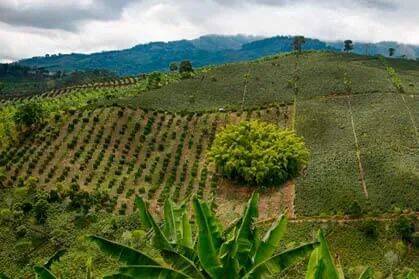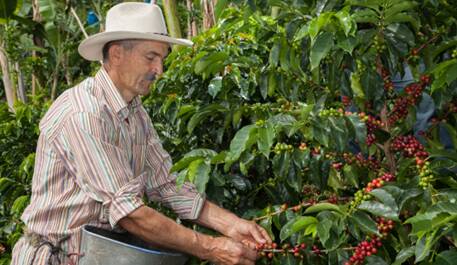Due to the decline in Colombian production and exports, FNC met with growers to discuss future strategies.
According to a report released by the Colombian National Federation of Coffee growers (FNC), coffee production in Colombia in February 2024 totaled 961000 bags, slightly higher than the 9.959 million bags in January and a decrease of 6.2 per cent compared with the same period last year. Although there has been a reduction in production, in the past 12 months, Colombian coffee production reached 11.3 million bags, an increase of 1.73% over the same period last year, with an overall slight increase.

In addition, Colombia exported 1.04 million bags of coffee in February, up 12.5% from 929000 bags in the same period last year. However, due to the recovery of coffee production of origin in neighboring countries such as Peru, Guatemala, Costa Rica, Nicaragua and El Salvador and the ability to buy coffee of similar quality at lower prices, Colombia exported 10.8 million bags of coffee in the past 12 months, a decrease of 3.1 per cent compared with the same period last year. In addition, these data show that Colombia has begun to shake off the influence of El Ni ñ o weather and begin to restore production, but coffee production is still not at its best because the drought brought by El Ni ñ o has hindered the growth of coffee trees.
And, despite getting rid of El Ni ñ o, the bad news is that La Nina weather will occur in June-August and may last throughout the second half of the year. Colombia has been affected by La Nina weather between 2022 and 2023, which lowers the temperature in coffee-producing areas and prolongs the coffee growing season, which makes coffee farms need to invest more manpower and material resources. in addition, geopolitics led to an increase in fertilizer costs, which increased the cost of producing a bag by 50%.

Therefore, considering that La Nina could have an impact on the coffee bean harvest in the future, the head of FNC and representatives of coffee growers from all over Colombia recently attended the FNC steering committee meeting to discuss disaster prevention measures to ensure the income of coffee producers.
And in order to promote Colombian coffee, it has announced the launch of Cafix, a coffee export platform, which will help export coffee at lower transportation costs, and coffee growers associated with Cafix can export small amounts of raw or cooked coffee beans to foreign customers at a price they agree to. And can save coffee growers about 70% to 80% of shipping costs, but also ensure that the product will reach the final buyer in perfect condition. Services are already provided to coffee growers who have customers abroad, and the next step will be to create a market for coffee growers and interested buyers to do business. Moreover, it is seeking to democratize coffee exports and give producers the opportunity to establish contacts with foreign customers to export coffee in a direct, agile and competitive manner.
Important Notice :
前街咖啡 FrontStreet Coffee has moved to new addredd:
FrontStreet Coffee Address: 315,Donghua East Road,GuangZhou
Tel:020 38364473
- Prev

Are thousands of coffee scented bottles worth buying? How much is the 36-flavor coffee nose? What's the use?
Studies have shown that there are as many as thousands of aromatic substances in coffee. But precisely because of its variety and complexity, it is difficult for people to reach a unified consensus through language description! For example, if there is a sweet and sour fruit taste in a cup of coffee, Mr. A will think that the sweet and sour taste is closer to lemon, while Mr. B will think
- Next

There is no way to refund the order! Consumers call Ruixing to announce the phone number of the store.
▲ Click to follow | Daily boutique coffee culture magazine Coffee Workshop friends should have used Mini Program to issue orders to buy coffee bar. Compared with App and third-party takeout platforms, Mini Program is easy to use and quick to use. Some chain coffee brands send discount coupons on Mini Program from time to time, so many people like to be small.
Related
- What grade does Jamaica Blue Mountain No. 1 coffee belong to and how to drink it better? What is the highest grade of Blue Mountain coffee for coffee aristocrats?
- What are the flavor characteristics of the world-famous coffee Blue Mountain No. 1 Golden Mantelin? What are the characteristics of deep-roasted bitter coffee?
- Can I make coffee a second time in an Italian hand-brewed mocha pot? Why can't coffee be brewed several times like tea leaves?
- Hand-brewed coffee flows with a knife and a tornado. How to brew it? What is the proportion of grinding water and water temperature divided into?
- What is the difference between Indonesian Sumatra Mantinin coffee and gold Mantinin? How to distinguish between real and fake golden Mantelin coffee?
- What does bypass mean in coffee? Why can hand-brewed coffee and water make it better?
- Unexpected! Ruixing Telunsu lattes use a smoothie machine to foam milk?!
- % Arabia's first store in Henan opens into the village?! Netizen: Thought it was P's
- Does an authentic standard mocha coffee recipe use chocolate sauce or powder? Mocha Latte/Dirty Coffee/Salty Mocha Coffee Recipe Share!
- What is the difference between Vietnam egg coffee and Norway egg coffee? Hand-brewed single product coffee filter paper filter cloth filter flat solution!

